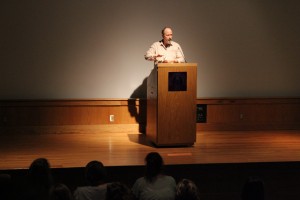The 2013 Spring Literary Festival ended last week, but WCU audiences had a variety of writers to hear, enjoy and learn from. It was a combination of Appalachian culture, rumors, poems and universal values.
Tuesday, April 10, featured writers Chris Holbrook, Mark Powell and Daniel Woodrell in the UC Theater.
Holbrook is recognized for his ability to search for and capture the heart of the region. He won the Thomas and Lillie D. Chaffin Award for Appalachian Writing for his collection of short stories titled, “Hell and Ohio: Stories of Southern Appalachia.”
Holbrook presented a story from his second group of short stories, “Upheaval,” which also focuses on the Appalachian region.
Powell followed Holbrook with a reading from a new novel that centered on the life of a drone pilot. The dramatic story follows a character that tries to balance his stressful career with family life.
A couple of themes explored in the story include the importance of pure intentions and a phenomenon Powell labeled a “missile induced” hangover. At one point in the story, the drone pilot denies being the judge, jury and executioner, but rather claims himself as an angel, awaiting the word of God, referencing the power he holds with his finger on the trigger. Then, moments later, he sits in his car in the parking lot, observing how he is just a regular man outside of his workplace.
Woodrell presented a couple of his short stories later Tuesday evening. The first story is from his upcoming novel that investigates different theories surrounding a mysterious, deadly explosion in a small town and is based on a true story.
Woodrell then presented a short story titled, “Uncle,” which is about an elderly man in a wheelchair and at the mercy of age, depending on other people to survive and move around. Everyone who met this man at any stage in his life knew him to be a complete jerk. The story paints a picture of how that particular dynamic might play out in the real world.
Both of the stories that Woodrell read were comprised of gossip and rumors that he had come across being drawn to the region’s culture.
Dr. Mae Claxton, associate professor in the English Department, said that out of the events that she attended in this year, Woodrell’s presentation was one her favorites because she has used some of his works while teaching classes at Western.
Stephanie Powell-Watts won the Ernest J. Gaines Award for Literary Excellence for her collection of short stories titled, “We Are Taking Only What We Need” in 2012. She is known for focusing her work on the south, but making it relatable to all by addressing universal problems.
Her presentation on April 11 focused on the different ways people tend to remember loved ones.
Bob Watts presented five poems from his award-winning collection, “Past Providence” and four poems from a new collection that he is working on.
Bob Watts’ acrostic poem, a poem in which an important word or phase is spelled out with the beginning letter of each line, “Preacher and Fall,” captivated the audience. The poem ended up spelling out “My God, My God, Why Have You Forsaken Me.”
His new collection, currently titled, “Tendencies of Bodies to be at Rest,” has three major themes: His deceased father, where work is missing and his son. He finished his readings with a poem dedicated to his son, “A Night of Waiting For Night and Son.”
Overall, the middle portion of the week-long Spring Literary Festival continued the trend set on Monday of featuring talented and accomplished writers with even more exclusive content previewed for WCU.
A section of Bob Watt’s poetry reading is available below:
The festival closed Thursday, April 11 with local writers Annette Saunooke Clapsaddle and Dawn Gilchrist-Young at 4 p.m. in the UC Theater and National Book Award-winning poet Nikky Finney at 7:30 p.m. in Coulter Auditorium.
The literary festival partners with ACE (Arts and Culture Events) to help bring in one “big” author each year. This year’s choice was Finney.
Claxton said that the festival is an opportunity to see both famous writers and up-and-coming writers and that the festival improves with each passing year. She said that it is important for the students to see how writing can enrich lives and see examples of how people are connected through words.
Marsha Lee Baker, also an associate professor in the English Department, shared some of the same thoughts by saying how the “inspirational” and “puzzling” experience gets more important to audiences as time goes on.
“As someone who has been at Western since the festival was inaugurated, and has attended every year except when I’ve been out of town, I’d say each year the festival becomes a more anticipated tradition for our campus and community. It’s more and more a part of who we are and what we do,” said Baker in an email message.
Claxton, who has literary festival posters dating back to 2003 hanging in her office, thinks that Western is reaching a ceiling with how big the festival can be, but wants to continue to try and pull in as much of the community as possible. “It takes a lot of people and work to pull off,” said Claxton.




